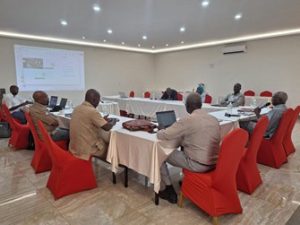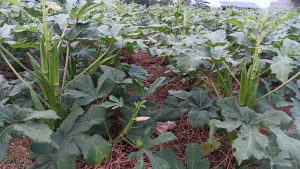CHAD: TAAT highlights multifaceted and Innovative Approaches to Wheat Research in Africa

Development Experts and Researchers have underlined the need to address insufficiency in wheat production in Africa through multifaceted and innovative approaches. This was made known during the recent Regional Planning Meeting of the National Center of Specialisation for Wheat (NCS-Wheat), held from July 29 to 31, 2024, at Hotel de l’Amitié, in Chad.
This pivotal gathering, which brought together various stakeholders dedicated to advancing wheat research in West and Central Africa, was organised jointly by the West and Central African Council for Agricultural Research and Development (CORAF) and the Chadian Institute of Agricultural Research for Development (ITRAD) alongside other partner organisations and programmes.
The meeting convened delegations from eight countries, including Benin, Cameroon, Gabon, Ivory Coast, Niger, Nigeria, Senegal, and Togo, alongside international research partners such as the International Institute of Tropical Agriculture (IITA), the International Maize and Wheat Improvement Center (CIMMYT) and collaborative networks like Wheat Network in West and Central Africa (WECAWheat).
Private sector actors and representatives from the Technologies for African Agricultural Transformation (TAAT) Programme and the Resilience Program (PRSA) also contributed, underlining a collaborative approach to tackling wheat research challenges.
The workshop’s primary objectives included bringing together researchers to discuss and advance wheat research issues specific to the NCS-Wheat, sharing recent research developments and innovations in regional wheat cultivation, developing coordinated action plans to guide research activities within the NCS-Wheat, and identifying research themes and jointly developing proposals to address critical challenges in wheat production.
Notable figures, including the national coordinator of the Food Systems Resilience Program (PRSA) and representatives from CORAF, outlined the imperatives of advancing wheat research in Africa through multifaceted and innovative approaches.
Yassine Doudoua, the ITRAD Director General delivered the opening address, emphasising the importance of collaborative efforts in enhancing agricultural research and development.
“Given the succession of food crises in the world, the importance of wheat in the food supply and the agricultural potential of West and Central Africa, Chad has opted to mobilise resources through the PRSA, financed by the World Bank, for the implementation of a National Center of Specialization on wheat,” Dr Doudoua said.
In addition, he added that the objective of this workshop was to bring together stakeholders in the wheat sector to plan activities for the year 2024-2025 and to define a roadmap for the NCS-wheat in Chad.
In his remarks, Dr Solomon Gizaw, the Head of TAAT Clearinghouse, identified TAAT’s multifaceted approach as pivotal for wheat research and production in Africa, citing successful examples from Ethiopia and Sudan.
Represented by Dr Christopher Suh, the TAAT Regional Coordinator for Central Africa, Dr Gizaw highlighted critical areas of focus including providing access to high-yielding, climate-resilient wheat varieties and agricultural practices (Technology Transfer), Investing in human capital development through training and mentorship programs (Capacity Building).
“Other areas requiring focal attention and commitment include creating an enabling environment for wheat production through policy reforms and investment (Policy Advocacy), and supporting small-scale milling technologies and other initiatives to enhance wheat processing and marketing (Value Chain Development),” Dr Gizaw added.
The event featured insightful presentations highlighting various aspects of wheat research, such as the Spirit and Attributes of the NCS-Wheat, Research Advances, Challenges and Opportunities, and Global Strategies for boosting wheat production.
Dr Lamien Nieyidouba from CORAF affirmed that the advent of the Russian-Ukrainian crisis affected African countries that relied heavily on imported wheat from these regions. “This situation constitutes a propelling reason for African countries to organize themselves better and become self-sufficient in wheat through innovative research and development in wheat,” Dr Nieyidouba added.
The WECAWheat Regional Network Coordinator, Prof. Benjamin Ewa Ubi, underscored wheat cultivation’s significance in Central and West Africa, noting its economic and nutritional importance.
Dr Turaki Zakari, the Director of Agricultural Research at the Lake Chad Research Institute in Nigeria, highlighted Chad’s agricultural potential for wheat cultivation, emphasising local advantages and existing challenges.
Dr. Bekele Abeyo from CIMMYT presented innovative breeding strategies tailored to African conditions to enhance wheat productivity and resilience.
Following robust discussions and thematic group sessions, participants proposed actionable recommendations, urging governments to support NCS-Wheat initiatives and monitor progress while CORAF pledged to support and facilitate strategic partnerships.
Emphasizing the need for technical and financial support from PRSA and international biotechnological centres, CIMMYT pledged support in technology dissemination and varietal improvement efforts.
The workshop strongly agreed on increased wheat research and development investment. Participants developed a roadmap outlining key priorities and actions to be taken in the coming year.
By fostering collaboration among researchers, policymakers, and the private sector, the NCS-Wheat can drive significant progress in wheat production and contribute to Africa’s food security goals.
Recent Stories
Related Stories
- South Sudan: TAAT holds High-level Consultative Workshop on Food Systems Transformation
- NIGERIA: TAAT hosts Stakeholders in second Wheat Seed Production Workshop
- TAAT holds regional workshop for Seed Actors in fragile states
- TAAT Engages Nigerian Stakeholders in Wheat Seed Sector Training
- Jigawa State Delegation explores scale-up Opportunities with TAAT





